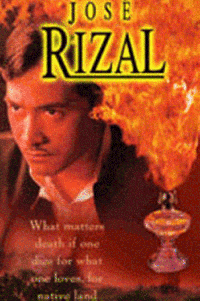José Rizal is a 1998 Philippine historical drama film directed by Marilou Diaz-Abaya and starring Cesar Montano as José Rizal. The film was based on the true story of Filipino patriot José Rizal, who was imprisoned under the Spanish colonization and tells Rizal's story until the final day of his execution.
| José Rizal | |
|---|---|
 | |
| Directed by | Marilou Diaz-Abaya |
| Screenplay by |
|
| Produced by |
|
| Starring | Cesar Montano |
| Cinematography | Rody Lacap |
| Edited by |
|
| Music by | Nonong Buencamino |
Production | |
| Distributed by | GMA Films[a] |
Release dates |
|
Running time | 175 minutes |
| Country | Philippines |
| Languages |
|
| Budget | ₱80 million (estimated) |
| Box office | ₱125 million |
At the time of its release, it was the most expensive film in the history of Filipino cinema with a budget of over ₱80 million. The film was an official entry to the 1998 Metro Manila Film Festival, swept most of the nominations with seventeen awards, making it the first film with the most MMFF award wins.
José Rizal is imprisoned in Fort Santiago due to his dissident activities. Meanwhile, in a small field in Balintawak, Andrés Bonifacio and his fellow secret organization, the Katipunan, commence the uprising against the tyranny created by the Spaniards by tearing their cédulas as a sign of freedom from Spanish slavery.
A first lieutenant of the Artillery, Luis Taviel de Andrade, visits Rizal. Taviel de Andrade does not waste time to study carefully Rizal's case. In just a short period, Rizal and Taviel capture each other's sympathy and eventually become friends during their usual meetings in Rizal's cell. Taviel celebrates Christmas with Rizal in the cell where they drink and sing together. Governor General Ramón Blanco also sympathizes with Rizal's cause but is later secretly ousted by corrupt Spanish officials and Manila's archbishop, who replace him with Camilo de Polavieja.
Flashbacks of Rizal's life are shown, from his childhood to his education, until his professional life as a doctor. He soon begins writing his two novels Noli Me Tángere and El Filibusterismo, which are then published. In addition, key scenes from the two novels are also shown.
After Christmas, Rizal is sent to the Real Audiencia, the colonial court of appeal, to hear the trial against him. Soon after, the magistrates decided to condemn him to the firing squad on the morning of the 30th in Luneta.
On the night before the execution, Rizal hallucinates, seeing his alter ego—protagonist, "Simoun" (the former Crisostomo Ibarra), from his second book, El Filibusterismo, tempting him to change the climax of the novel.
On the morning of his execution, his kin receives a small alcohol stove (not a gas lamp as commonly portrayed) from his cell containing his last poem "Mi último adiós". Stopping at the place of execution facing the rising sun, Rizal requests the authorities for him to face the firing squad, but the request is denied. Calm and without haste, he requests to have his head spared instead and the captain agrees. At the moment the firing squad aims at his back, he utters his final words: Consummatum est ("It is done").
In the events following Rizal's execution, members of the Katipunan begin their armed uprising, completely catching the Spanish forces off guard, seizing their mounts, munitions, and rifles. After that, the organization captures a church and the members execute the friars in an act of vengeance. Later that night, Bonifacio and his top generals meet in their headquarters to plan a new offensive seeking to capture ten towns in one week from the Spaniards. As Bonifacio continues speaking, the camera pans to Rizal's picture at the wall of his headquarters before revealing Rizal's hat which sat by the shores of Manila Bay, concluding with the text of events that transpired after his death.
In 1994, there were efforts to produce a Hollywood feature film based on the life of José Rizal led by director Cirio H. Santiago, then the head of the Film Development Foundation of the Philippines, with the approval of President Fidel V. Ramos. Actors who were reportedly considered for the project included Andy Garcia as Rizal, Winona RyderasJosephine Bracken, and Sharon CunetaasLeonor Rivera, with Jonathan Demme as director, though the project did not come to fruition.[1]
The series was released in DVD-format and VCD format by GMA Records Home Video and distributed by Viva Video.
The film has been screened and run in the competition in different film festivals worldwide and included in the Official Selection for Panorama at the Berlin International Film Festival (1998). It also won 2nd runner-up in the Audience Award of the Toronto Filmfest and the Chicago International Film Festival.[citation needed]